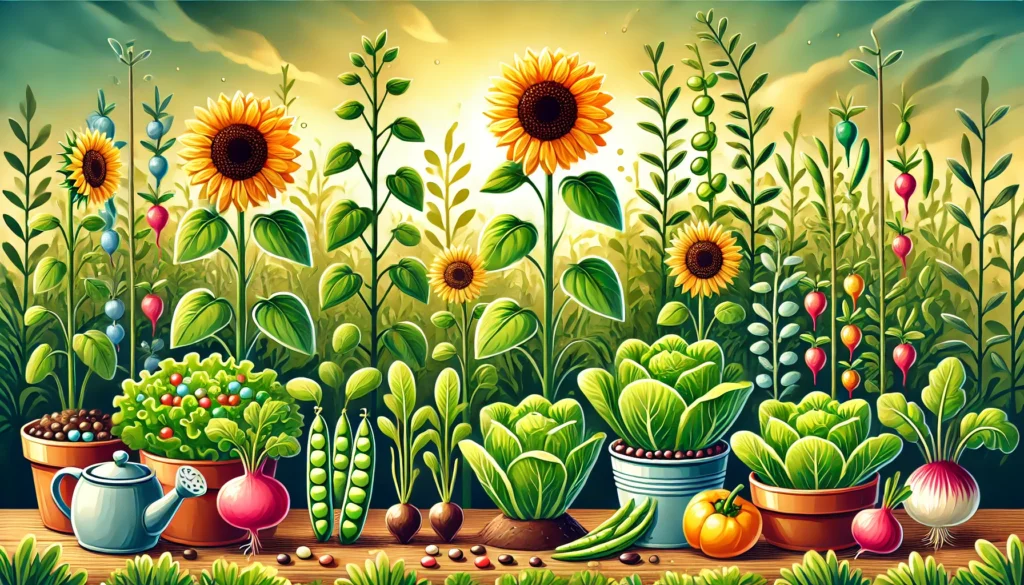
Top 10 Fastest-Growing Seeds for Beginners: Easy Plants for Quick Results
If you’re new to gardening and eager to see fast results, choosing the fastest-growing seeds for beginners is the perfect way to kickstart your green thumb journey. Whether you’re growing for beauty, food, or simply the joy of watching plants thrive, some seeds are quicker to sprout and flourish than others. In this guide, we’ll introduce you to the top 10 fastest-growing seeds that are not only easy to plant but also require minimal care. Say goodbye to long waits—these plants will reward your efforts with rapid growth and vibrant results!
Table of Contents
Toggle🌱 Why Choose Fast-Growing Seeds for Beginners? 🌸
Starting a garden as a beginner can be both exciting and overwhelming. One of the best ways to set yourself up for success is by choosing fast-growing seeds. These seeds are perfect for beginners for several reasons:
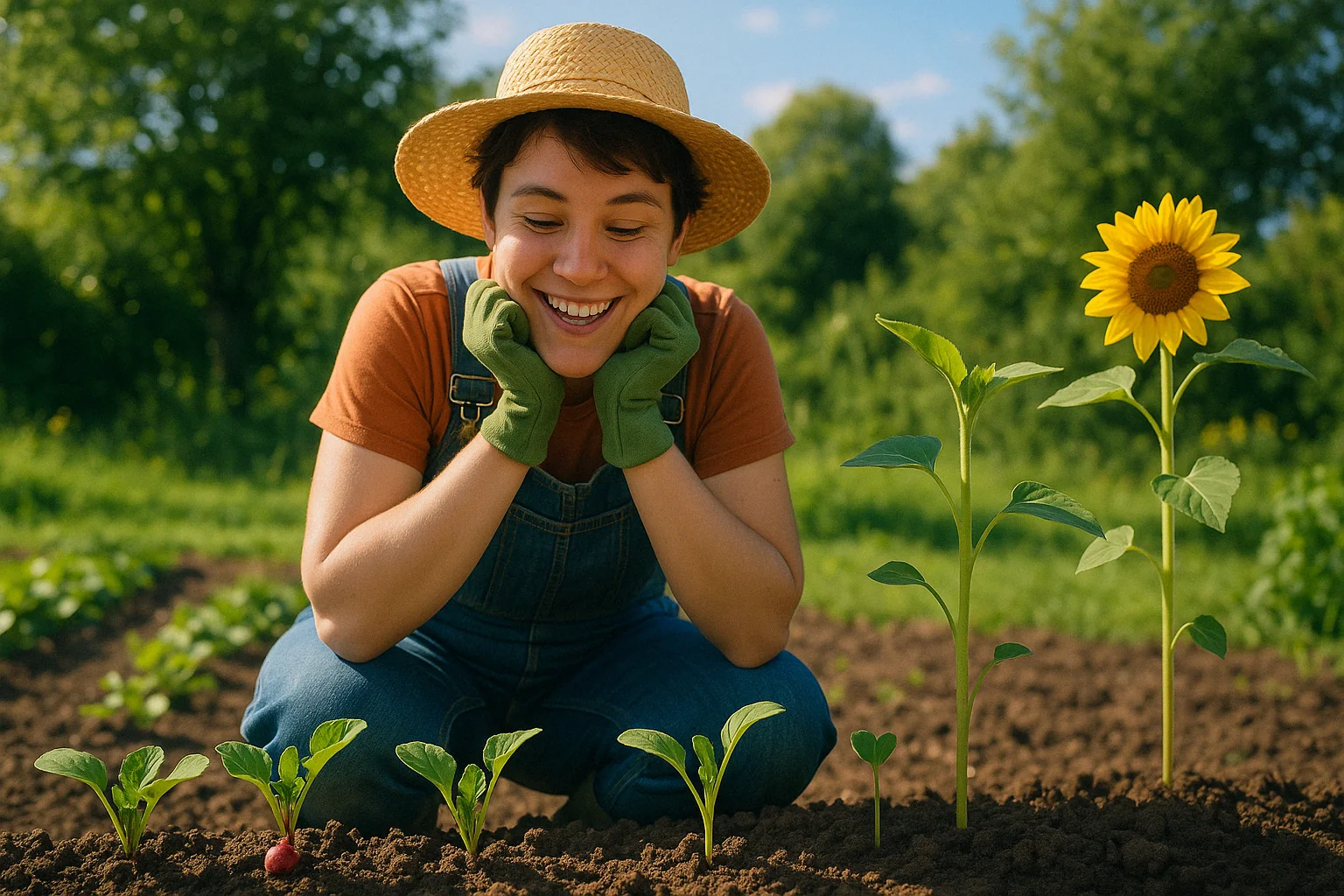
🚀 Quick Results and Instant Gratification 🌼
Fast-growing seeds typically sprout and mature quicker, allowing you to see the results of your hard work in just a few weeks. This immediate gratification is motivating and keeps beginners engaged throughout the process.
🛡️ Less Room for Error 🌿
With a shorter growth cycle, there’s less chance for issues like pests, diseases, or environmental stress to take over. This gives beginners more room to learn and experiment without worrying about long-term problems.
🌱 Learn Gardening Basics Fast 🌸
Fast-growing plants allow you to understand essential gardening skills such as watering, soil management, and proper sunlight. By growing something that doesn’t take too long to mature, you can apply these skills multiple times in a single growing season.
💪 Increased Confidence 🌻
Seeing quick progress boosts confidence and encourages beginners to try more complex gardening projects in the future. It creates a sense of accomplishment, making it easier to stick with gardening in the long term.
Choosing fast-growing seeds is a smart and rewarding strategy for new gardeners. It allows you to learn, enjoy the process, and gain practical gardening experience in a short amount of time.
🌿 Factors to Consider When Choosing Seeds for Beginners 🌼
Choosing the right seeds is a crucial step for beginners in gardening. Here are the key factors to consider when selecting seeds for a successful gardening experience:
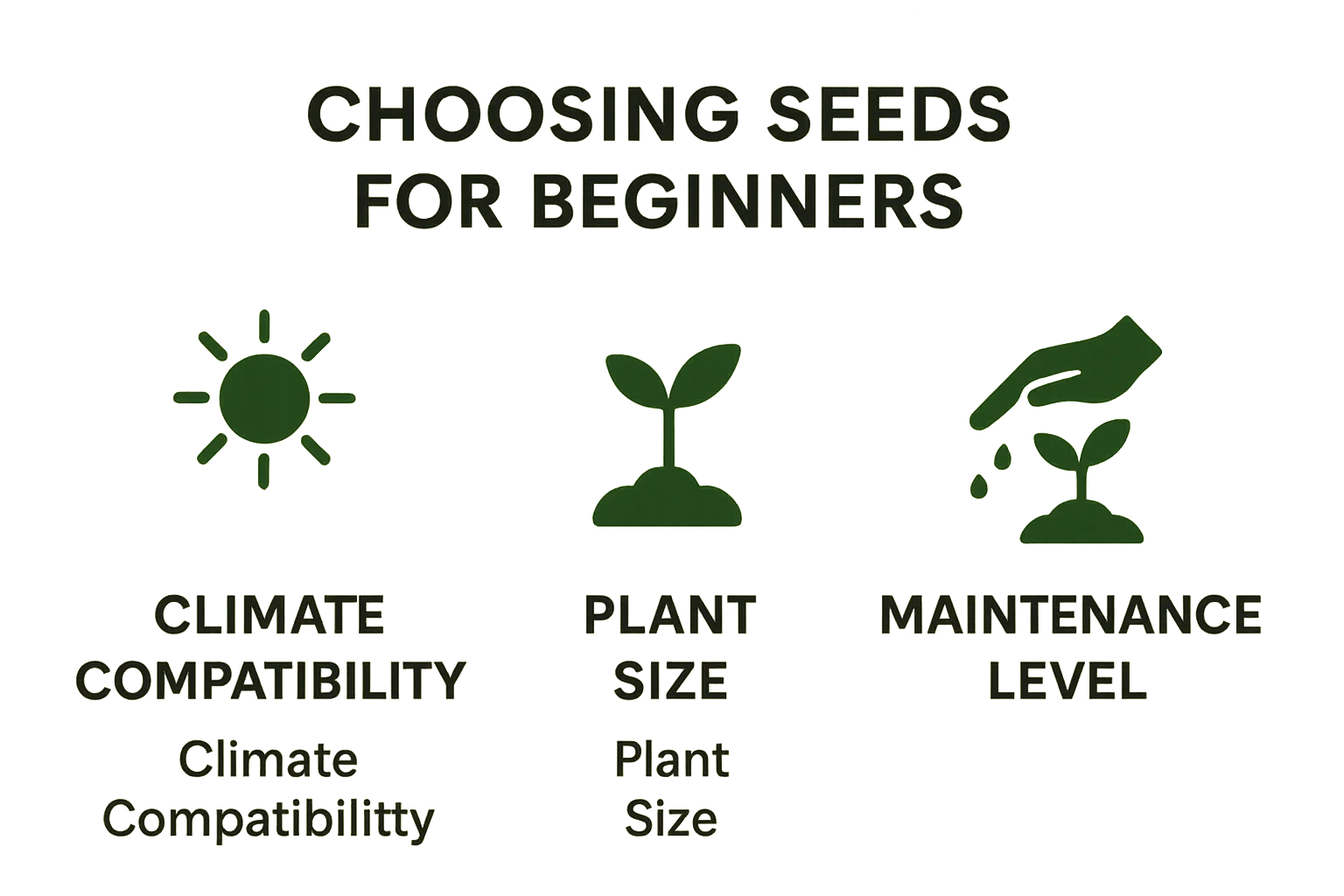
🌍 1. Climate Compatibility 🌞
Choose seeds that are suited to your local climate. Understanding your hardiness zone helps in selecting plants that will thrive in your environment. Look for plants that are known to grow well in your region’s temperature and weather conditions.
🌡️ 2. Growing Season 🏞️
Consider the length of your growing season. Some plants require a long growing season, while others thrive in a shorter period. Opt for seeds that match your region’s growing season for the best results.
🌻 3. Plant Size and Space 🌿
Beginner gardeners often have limited space. Choose plants that won’t overcrowd your garden. Compact varieties, like dwarf vegetables or smaller flowers, are ideal for small spaces. Always check the expected mature size of the plant before planting.
🌱 4. Ease of Growth 🌸
Select seeds from plants that are known to be easy to grow, such as radishes, beans, or sunflowers. These plants are more forgiving, making them perfect for beginners who are still learning the ropes of gardening.
💧 5. Maintenance Level 🌼
Some plants need regular care and attention, while others are low-maintenance. If you’re new to gardening, consider seeds for plants that don’t require constant care or complex techniques. This will help you stay motivated and build your gardening confidence.
🌿 6. Disease Resistance 🍃
Look for seeds labeled as “disease-resistant.” These varieties are more likely to thrive without requiring extra effort to prevent pests and diseases, which can be a challenge for beginners.
By keeping these factors in mind, you’ll set yourself up for a successful and enjoyable gardening experience. Always choose seeds that align with your gardening skills and available resources.
🌱 The Top 10 Fastest-Growing Seeds for Beginners 🌸
Starting a garden can be an exciting and rewarding experience, especially when you choose fast-growing seeds. Whether you’re a seasoned gardener or a first-timer, quick-growing plants can help build your confidence and ensure early success. Here are the top 10 fastest-growing seeds for beginners, providing you with beautiful results in no time.
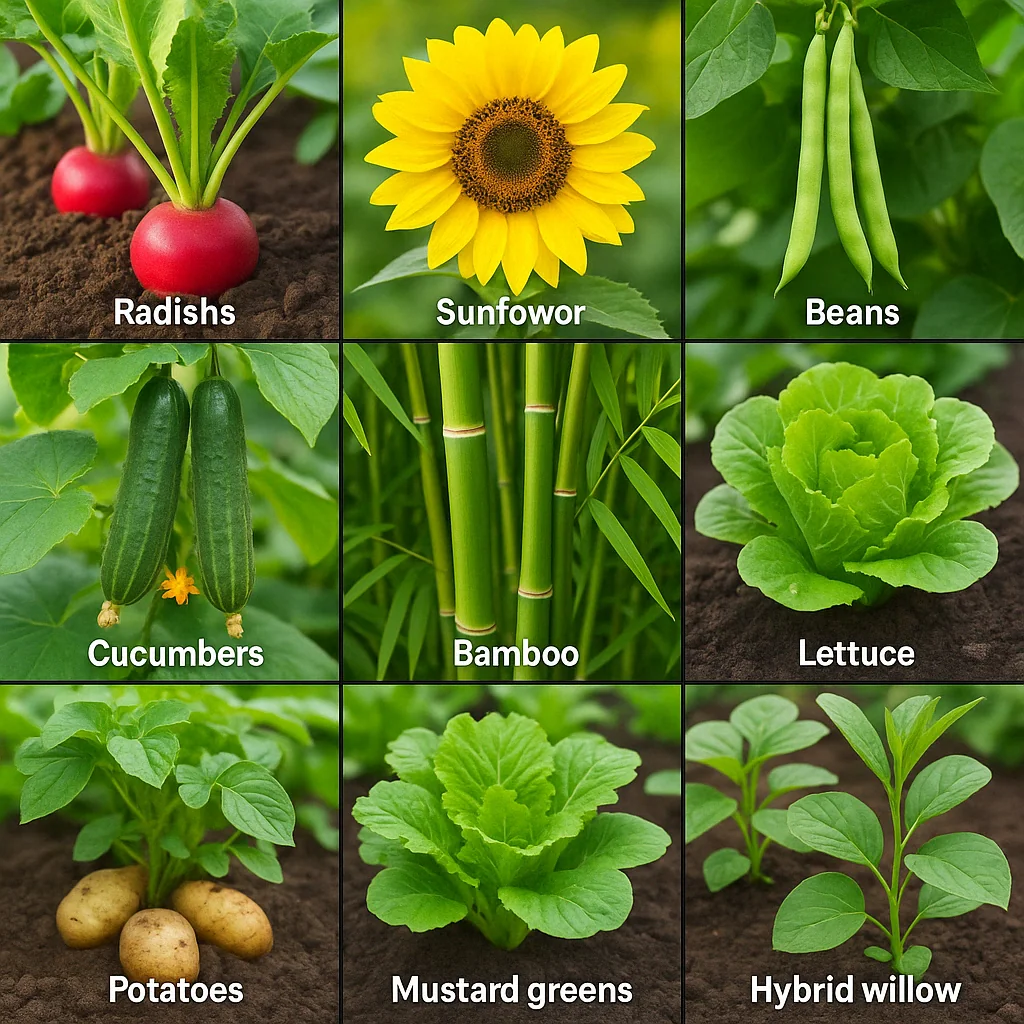
🌶️ 1. Radishes 🥕
Radishes are one of the quickest crops to grow, often ready in as little as 3 to 4 weeks. They thrive in most climates and can be grown year-round. Radishes are perfect for beginners as they require minimal care and grow well in both containers and garden beds.
🥬 2. Lettuce 🌱
Lettuce is a versatile and fast-growing leafy green that can be harvested in as little as 30 days. It grows best in cool weather, making it ideal for spring or fall planting. You can harvest individual leaves or entire heads, depending on your preference.
🌻 3. Sunflowers 🌞
Sunflowers are not only beautiful but fast-growing, with some varieties reaching full height in just 70 days. They thrive in full sun and are easy to care for, making them a perfect choice for beginners.
🌿 4. Beans 🫘
Beans, especially bush beans, grow quickly and can be harvested in 50 to 60 days. They’re great for beginners because they don’t need much attention and can be grown in small spaces. Beans are also excellent for improving soil health.
🥒 5. Cucumbers 🥒
Cucumbers can mature in around 50 to 70 days. They grow best in warm conditions and need full sun. Starting with compact varieties makes them ideal for small garden spaces or containers.
🍃 6. Spinach 🍂
Spinach grows quickly and can be harvested within 4 to 6 weeks. It thrives in cooler temperatures and is perfect for spring or fall gardens. Plus, it’s a nutritious addition to any meal.
🍲 7. Zucchini 🍞
Zucchini plants grow rapidly, producing fruit in about 50 to 55 days. They’re prolific producers, so you’ll quickly have more than enough to harvest. Zucchini requires plenty of sunlight and regular watering for optimal growth.
🌿 8. Peas 🌿
Peas are perfect for cooler climates and grow quickly, maturing in about 60 days. They require minimal care, and their vines are easy to support with trellises or fences. You can harvest fresh peas early in the growing season.
🥕 9. Carrots 🥕
Carrots are easy to grow and can be harvested in 50 to 70 days, depending on the variety. While they prefer loose, sandy soil, they can be grown in containers or raised beds, making them great for beginners.
🌿 10. Basil 🍃
Basil grows quickly and can be ready for harvest in as little as 30 days. It thrives in warm weather and full sun. Basil is ideal for windowsills or small containers, making it easy to grow indoors or outdoors.
By starting with these fast-growing seeds, beginners can enjoy a successful and satisfying gardening experience. These plants not only grow quickly but also require little maintenance, allowing you to enjoy a beautiful and productive garden in no time.
🌿 How to Care for Fast-Growing Seeds 🌱
Caring for fast-growing seeds requires attention to detail to ensure they thrive and reach their full potential. Here’s a simple guide to help you manage the growth process effectively.
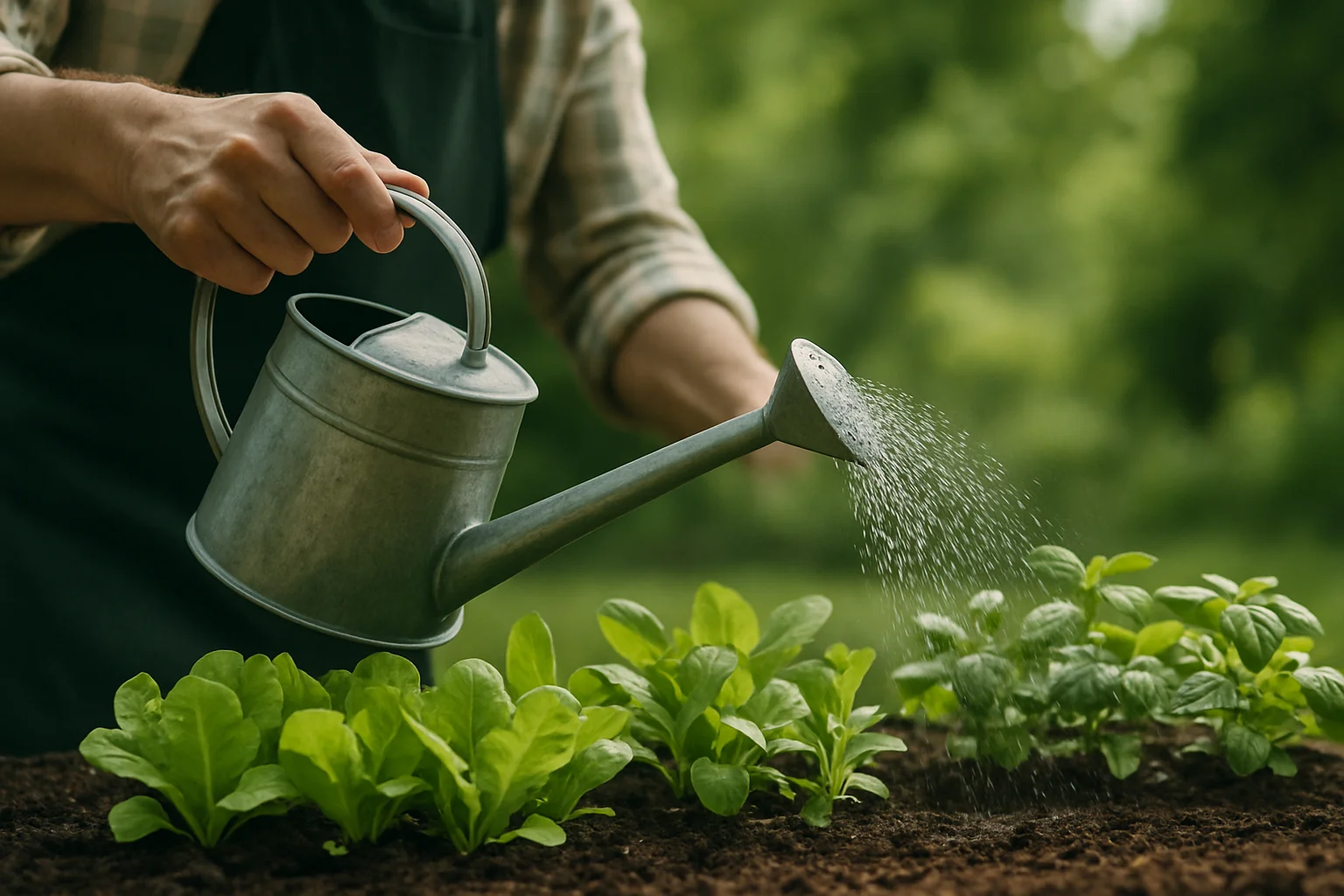
🌱 1. Choose the Right Soil 🌾
Fast-growing seeds need well-drained, nutrient-rich soil. Opt for a lightweight, loamy mix with good moisture retention to support rapid growth. Avoid heavy clay soils as they can cause waterlogging.
💧 2. Water Consistently 🌸
Water the soil consistently to keep it moist but not soggy. Fast-growing seeds benefit from regular, light watering. Be careful not to overwater, as this can lead to root rot. Use a fine mist or gentle watering can to avoid displacing the seeds.
🌞 3. Provide Adequate Light 🌞
Most fast-growing plants need plenty of sunlight to grow quickly. Aim for at least 6-8 hours of direct sunlight a day. If growing indoors, use grow lights to supplement natural light, especially during darker months.
🌡️ 4. Maintain Optimal Temperature 🌡️
Seeds typically germinate best at temperatures between 65°F and 75°F (18°C-24°C). Keep the growing area warm, especially if you’re starting seeds indoors. A seed mat can help maintain a consistent temperature for germination.
✂️ 5. Thin Seedlings Early 🌱
Once seedlings appear, thin them out to prevent overcrowding. This will allow each plant to access more nutrients, water, and light, helping them grow faster. Thin them when they’re a few inches tall, leaving the strongest plants.
💧 6. Fertilize Lightly 🌿
Fast-growing seeds can benefit from light feeding. Use a balanced liquid fertilizer once seedlings have developed a couple of leaves. Over-fertilizing can harm delicate roots, so apply nutrients sparingly.
✂️ 7. Prune Regularly 🌱
To promote healthy growth, prune fast-growing plants regularly. This will help direct energy into producing strong stems and leaves instead of allowing the plant to become leggy. Remove any dead or damaged growth to keep the plant vigorous.
By following these simple steps, you’ll give your fast-growing seeds the best chance for healthy and rapid growth, ensuring they flourish throughout their growing season. 🌿🌻
🌱 Troubleshooting Common Problems with Fast-Growing Seeds 🌿
When growing fast-growing seeds, gardeners often face a few common challenges. Here are the most frequent problems and practical tips for solving them:
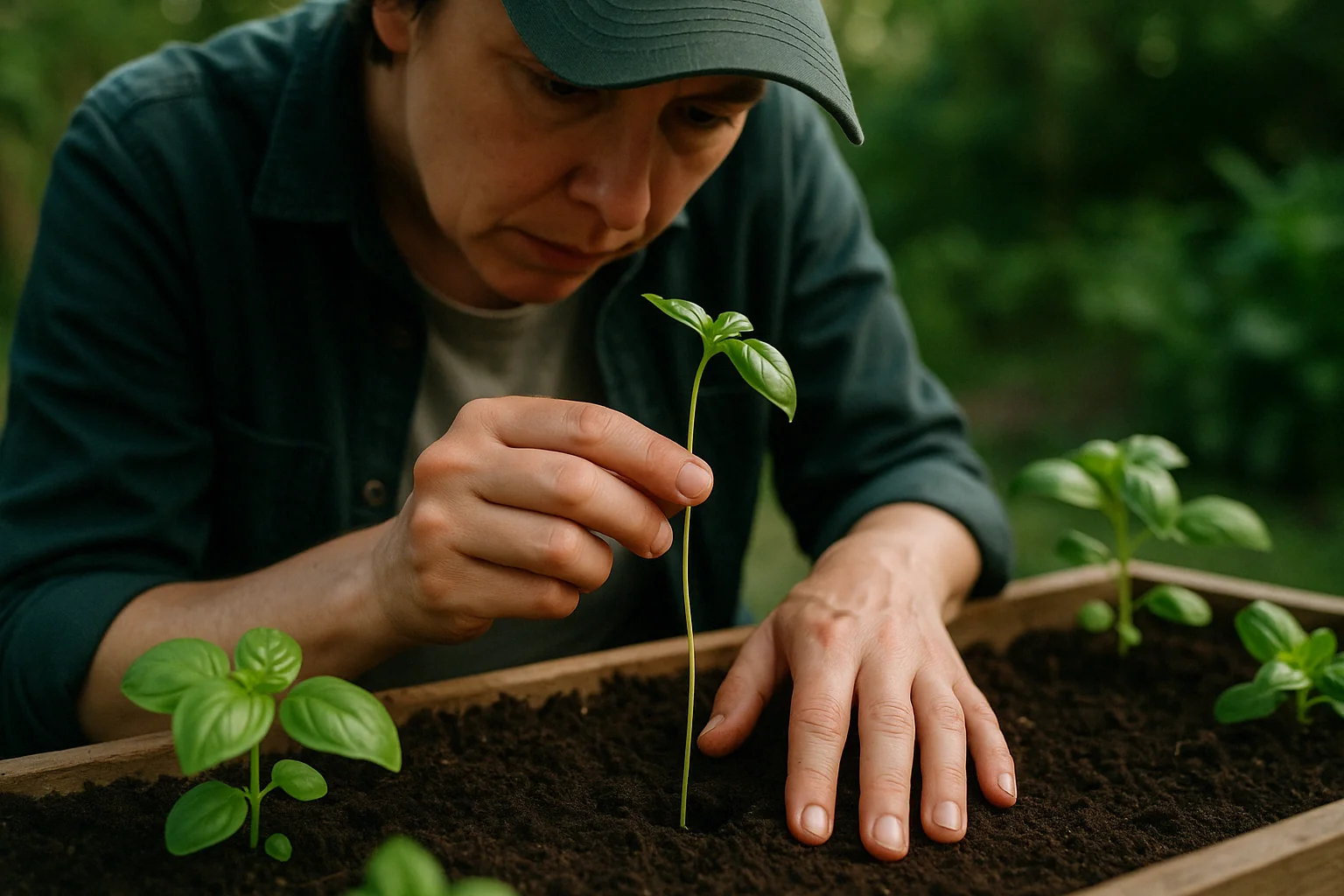
🌾 Uneven Germination 🌱
If some seeds germinate faster than others, it may be due to varying seed quality or inconsistent planting depth. Ensure you plant seeds at the recommended depth and maintain consistent moisture. If you’re planting a variety of seeds, consider starting them in separate trays for more control over the environment.
🌞 Leggy Seedlings 🌱
Seedlings that are tall, thin, and weak likely aren’t getting enough light. Ensure they receive at least 12-16 hours of light daily, either from natural sunlight or grow lights. If using grow lights, place them close to the plants (2-4 inches above) to prevent legginess.
💧 Overwatering or Underwatering 🌱
Fast-growing seeds need balanced moisture. Too much water can lead to root rot, while too little can dry out seedlings. Check the soil regularly by feeling for dampness. If it’s too dry, water gently; if it’s soggy, reduce watering and improve drainage.
🍃 Nutrient Deficiencies 🌿
Fast-growing seeds can deplete soil nutrients quickly. If seedlings turn yellow or grow slowly, they may need fertilizer. Choose a balanced, water-soluble fertilizer, and apply according to the label instructions to support healthy growth.
🐞 Pests and Disease 🌿
Fast-growing seedlings can be vulnerable to pests like aphids or fungal diseases. Inspect your plants regularly for signs of insects or disease. If you spot any issues, remove affected leaves and treat with organic insecticide or fungicide. Keep the growing area clean and avoid overcrowding to reduce the risk.
By addressing these common problems early, you can ensure the success of your fast-growing seeds, leading to a vibrant and healthy garden.
🌸 Final Tips for Success with Fast-Growing Seeds 🌿
To ensure the best results with fast-growing seeds, consider these expert tips:
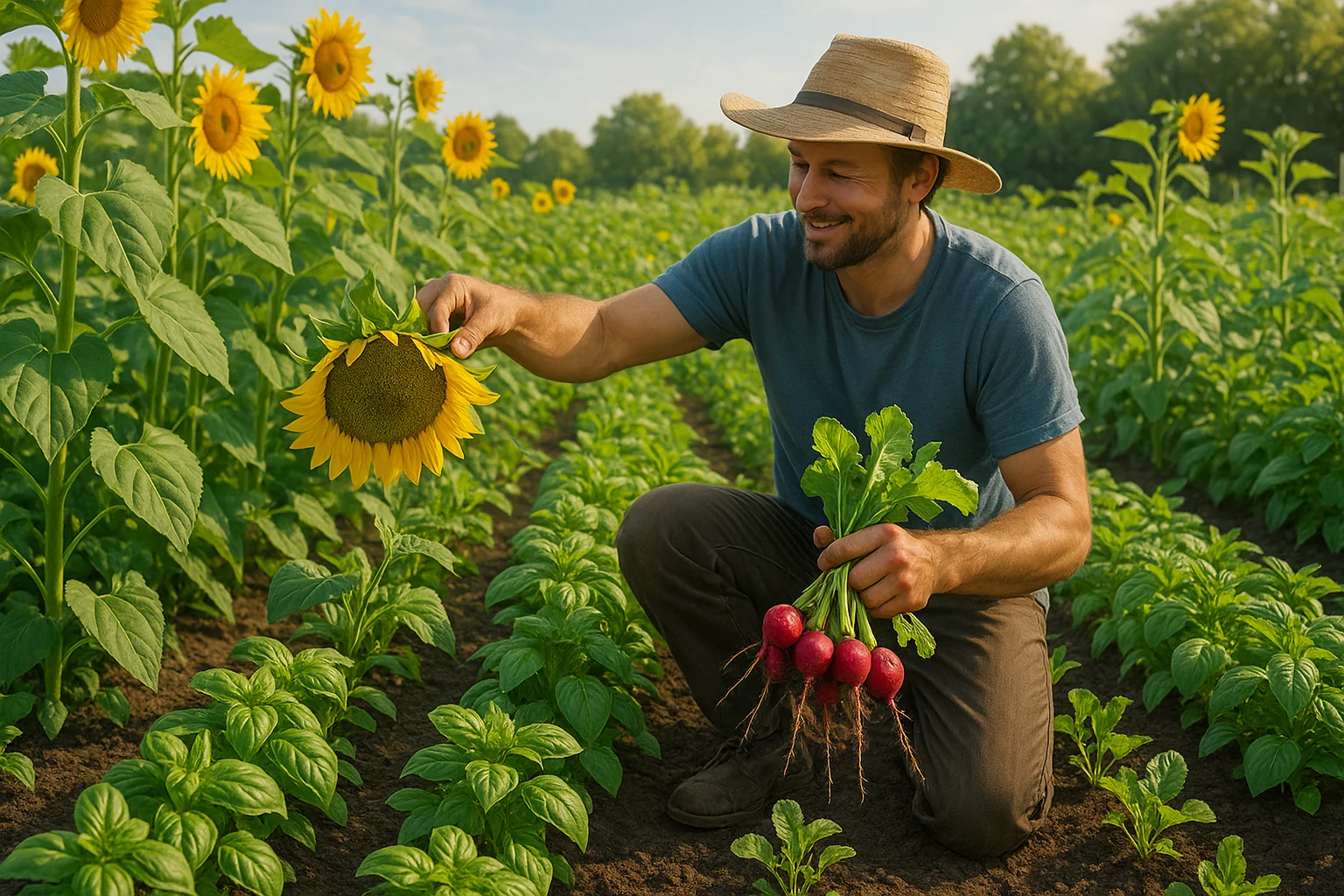
🌻 Choose the Right Seeds 🌱
Select fast-growing varieties that are suited for your local climate and growing conditions. Some seeds, like radishes or lettuce, thrive in cooler temperatures, while others, like beans or sunflowers, need warmth to grow quickly.
🌿 Prepare Your Soil Properly 🍂
Healthy soil is key to rapid growth. Make sure it’s loose, well-draining, and rich in nutrients. Adding compost can improve soil fertility and encourage seedling health.
💧 Water Consistently 🌱
Keep the soil evenly moist, but not waterlogged. Fast-growing plants need regular watering to establish strong roots and support rapid growth. Early morning watering is ideal to avoid disease.
🌞 Provide Adequate Light 🌞
Ensure your seeds get enough sunlight, as most fast-growing plants need at least 6 hours of direct sunlight daily. If growing indoors, use grow lights to supplement natural light.
✂️ Thin Seedlings 🌱
As your plants begin to grow, thin them out to prevent overcrowding. This gives each plant enough space to thrive and reach its full potential.
🌱 Fertilize Wisely 🌿
Use a balanced fertilizer to give your plants the nutrients they need without overfeeding. Too much fertilizer can harm plants, so follow instructions carefully.
🐞 Monitor for Pests 🌿
Fast-growing plants are often vulnerable to pests. Keep an eye out for signs of damage, and address infestations early with natural remedies or organic pesticides.
🌸 Harvest at the Right Time 🍅
Don’t wait too long to harvest. Fast-growing crops are often at their peak flavor and quality when harvested at the right time—before they become overripe or stressed.
By following these simple but effective tips, you’ll maximize your success with fast-growing seeds and enjoy a flourishing garden in no time. These suggestions are perfect when choosing the Fastest-Growing Seeds for Beginners, ensuring quick results and gardening satisfaction. 🌸🌿
🌱 Final Thoughts 🌿
Fast-growing seeds offer an excellent starting point for beginners looking to dive into gardening. With quick results, minimal care, and a rewarding experience, these plants make gardening both enjoyable and fulfilling. By choosing the right seeds, understanding how to care for them, and troubleshooting common problems along the way, you’ll set yourself up for success.
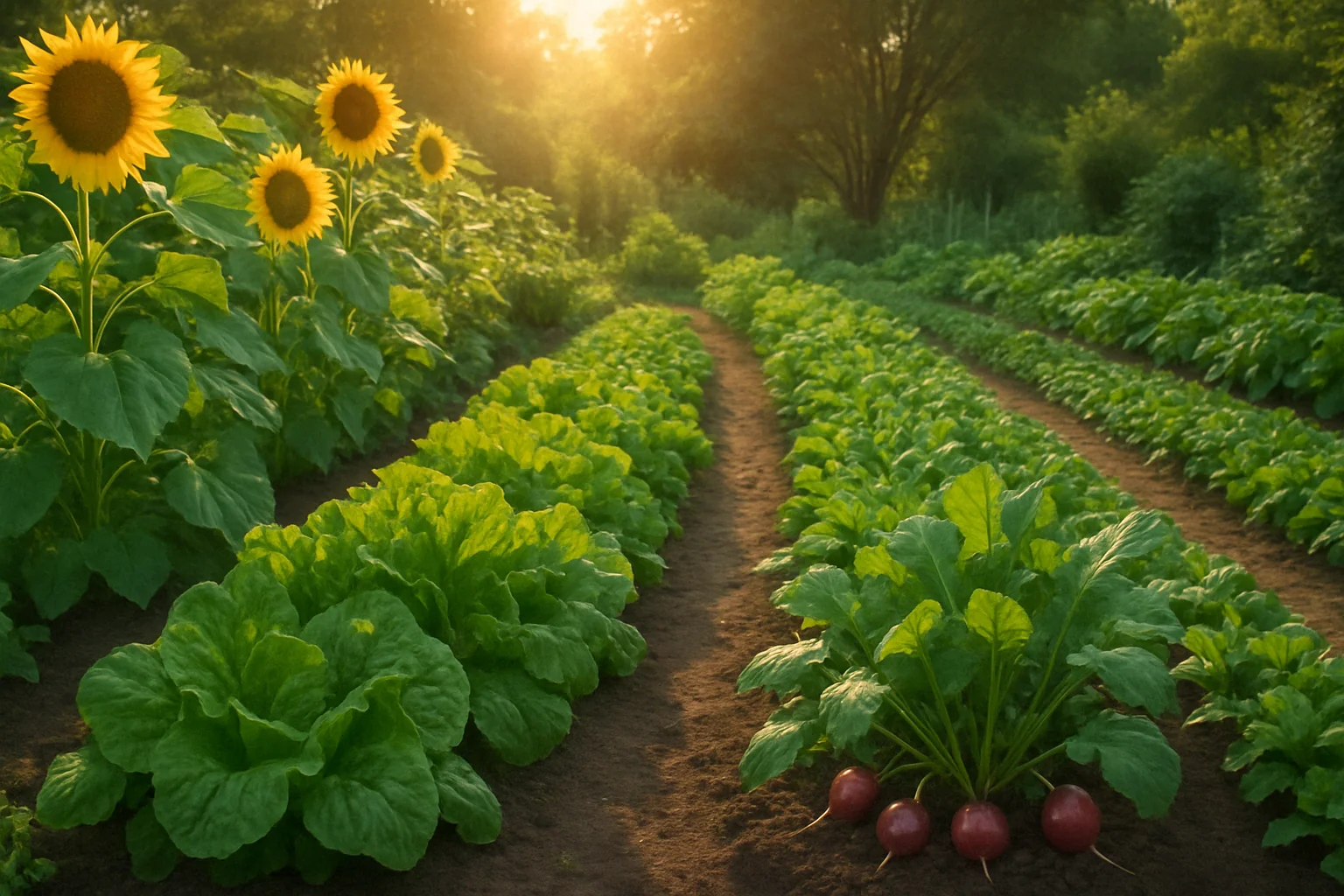
Remember, gardening is a journey, and even the most experienced gardeners learn new things each season. Fast-growing plants provide not only a quick payoff but also a foundation for developing your skills and growing confidence. So, whether you’re growing fresh veggies for your meals or creating a colorful flower garden, these fast-growing seeds will bring joy and satisfaction to your gardening experience.
Happy gardening, and may your plants grow strong, healthy, and beautiful! 🌱🌸🌿
Frequently Asked Questions (FAQ)
What are the fastest-growing seeds for beginners?
The fastest-growing seeds for beginners include radishes (3-4 weeks), lettuce (30-45 days), sunflowers (7-10 days to sprout), bush beans (50-60 days), and zinnias (60-70 days). These plants are known for their quick germination and easy care, making them ideal for those just starting their gardening journey.
How do I choose the best fastest-growing seeds for my garden?
When choosing the best seeds, consider your climate, growing space, and how much care you can provide. Opt for seeds that are well-suited to your local environment and those that match your gardening goals. For beginners, choose plants that are low-maintenance and adaptable to different conditions.
How can I speed up the germination of seeds?
To speed up germination, make sure you’re providing optimal growing conditions, such as the right temperature, consistent moisture, and sufficient light. Using a seedling heat mat can also help maintain the ideal temperature for seed growth, leading to quicker germination.
Are fast-growing seeds harder to care for?
Not necessarily. Many fast-growing seeds are perfect for beginners because they require less care compared to more delicate plants. However, providing proper watering, light, and the right soil conditions will ensure the best results. Always research the specific care needs of each plant to ensure success.
Can I grow fast-growing seeds in containers?
Yes, many fast-growing seeds can be successfully grown in containers. Plants like lettuce, radishes, and zinnias thrive in pots and small spaces. Just make sure the containers have proper drainage, and choose varieties that don’t require too much space to spread.
How long do fast-growing plants take to mature?
The time it takes for fast-growing plants to mature varies, but many of the seeds listed in this article mature in 30 to 90 days, depending on the variety. For instance, radishes can mature in as little as 3-4 weeks, while beans and cucumbers take around 50-70 days.
Are there any fast-growing seeds that I can plant in the fall?
Yes, certain fast-growing seeds, like spinach, lettuce, and radishes, are well-suited to cooler fall temperatures. These seeds thrive in the fall season, as long as they’re planted early enough to reach maturity before the first frost.
Can I grow fast-growing seeds indoors?
Yes, many fast-growing seeds can be started indoors, especially in cooler climates or when you want to get a head start on the growing season. Plants like sunflowers, beans, and zinnias can be started indoors and later transplanted outside when the weather warms up.
